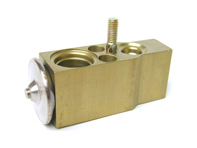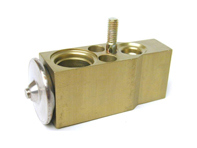Air con evaporators & expansion valves
 Air conditioning expansion valve. Porsche Boxster / Cayman / 996 / 997
Air conditioning expansion valve. Porsche Boxster / Cayman / 996 / 997

- Porsche Boxster 986 2.5L 1997-99
- Porsche Boxster 986 2.7L 1999-02
- Porsche Boxster S 986 3.2L 1999-02
- Porsche Boxster 986 2.7L 2003-04
- Porsche Boxster S 986 3.2L 2003-04
- Porsche Boxster 987 2.7L 2005 -08/08
- Porsche Boxster 987 S 3.2/3.4L 2005-08/08
- Porsche 996 C2 3.4L 1997-08/01
- Porsche 996 C4 3.4L 1997-08/01
- Porsche 996 C2 3.6L 09/01-2005
- Porsche 996 C4 3.6L 09/01-2005
- Porsche 996 C4S 3.6L 09/01-2005
- Porsche 996 TURBO 2000-05
- Porsche 996 GT2 2001-05
- Porsche 996 GT3 MKI 1999-02
- Porsche 996 GT3 MKII 2003>>
- Porsche 996 GT3 RS 2003-04
- Porsche 997 Carrera 2 3.6L 2005>>
- Porsche 997 Carrera 2S 3.8L 2005>>
- Porsche 997 Carrera 4 3.6L 2005>>
- Porsche 997 Carrera 4S 3.8L 2005>>
- Porsche 997 TURBO 2007>>
- Porsche 997 GT3 2007>>
- Porsche 997 GT2 2007>>
- Porsche Cayman 2.7L 987C 2006-08
- Porsche Cayman S 3.4L 987C 2005-08
- Porsche Cayman 2.9L 987C MKII 2009-12
- Porsche Cayman S / R 3.4L 987C MKII 2009-12

Fits:
Porsche 986 Boxster 1997-04
Porsche 987 Boxster 2005-08
Porsche 987C.1 Cayman 2005-08
Porsche 987C.2 Cayman 2009-13
Porsche 996 1998-05
Porsche 997.1 2005-08
Click 'Zoom in' for large parts diagram
Diagram ref no 4
Related reference numbers
Related, superseded, cross reference or alternative numbers for comparison.
99657392901
The product you are viewing cross references to these numbers
 Shop Securely
Shop Securely
 12 Month Warranty
12 Month Warranty
 Worldwide Delivery
Worldwide Delivery
 Air conditioning expansion valve. Porsche Boxster / Cayman / 996 / 997
Air conditioning expansion valve. Porsche Boxster / Cayman / 996 / 997

- Porsche Boxster 986 2.5L 1997-99
- Porsche Boxster 986 2.7L 1999-02
- Porsche Boxster S 986 3.2L 1999-02
- Porsche Boxster 986 2.7L 2003-04
- Porsche Boxster S 986 3.2L 2003-04
- Porsche Boxster 987 2.7L 2005 -08/08
- Porsche Boxster 987 S 3.2/3.4L 2005-08/08
- Porsche 996 C2 3.4L 1997-08/01
- Porsche 996 C4 3.4L 1997-08/01
- Porsche 996 C2 3.6L 09/01-2005
- Porsche 996 C4 3.6L 09/01-2005
- Porsche 996 C4S 3.6L 09/01-2005
- Porsche 996 TURBO 2000-05
- Porsche 996 GT2 2001-05
- Porsche 996 GT3 MKI 1999-02
- Porsche 996 GT3 MKII 2003>>
- Porsche 996 GT3 RS 2003-04
- Porsche 997 Carrera 2 3.6L 2005>>
- Porsche 997 Carrera 2S 3.8L 2005>>
- Porsche 997 Carrera 4 3.6L 2005>>
- Porsche 997 Carrera 4S 3.8L 2005>>
- Porsche 997 TURBO 2007>>
- Porsche 997 GT3 2007>>
- Porsche 997 GT2 2007>>
- Porsche Cayman 2.7L 987C 2006-08
- Porsche Cayman S 3.4L 987C 2005-08
- Porsche Cayman 2.9L 987C MKII 2009-12
- Porsche Cayman S / R 3.4L 987C MKII 2009-12

Fits:
Porsche 986 Boxster 1997-04
Porsche 987 Boxster 2005-08
Porsche 987C.1 Cayman 2005-08
Porsche 987C.2 Cayman 2009-13
Porsche 996 1998-05
Porsche 997.1 2005-08
Click 'Zoom in' for large parts diagram
Diagram ref no 4
Related reference numbers
Related, superseded, cross reference or alternative numbers for comparison.
99657392901
The product you are viewing cross references to these numbers
 Shop Securely
Shop Securely
 12 Month Warranty
12 Month Warranty
 Worldwide Delivery
Worldwide Delivery
The car air conditioning evaporator plays a key role in the heat exchange process that allows the A/C system to operate effectively.
As outdoor air flows through the evaporator fins, it cools down by transferring its heat to the refrigerant. The cooled air is then directed into the cabin at temperatures ranging from 2°C to 10°C.
While air conditioning is typically associated with cooling, one of its crucial functions is to dehumidify the air. Lowering humidity levels is particularly important in cold weather, as passengers can quickly cause condensation to form on the vehicle’s windows.
As the cabin air passes through the A/C system, moisture condenses on the evaporator fins, removing excess humidity from the air. This collected moisture is drained and discharged underneath the vehicle.
The expansion valve receives the refrigerant in a fully filtered, 100% liquid form and reduces its pressure before it enters the evaporator. This pressure reduction cools the refrigerant, which is then sprayed into the evaporator. In car A/C systems, the expansion valve is always connected to the evaporator.
As a precision component, the expansion valve is complex and sensitive to any contaminants or acids circulating within the air conditioning system. If the valve becomes blocked, it can lead to a significant loss of cooling or potentially damage the compressor, as improper flow regulation may allow liquid refrigerant to reach the compressor.








